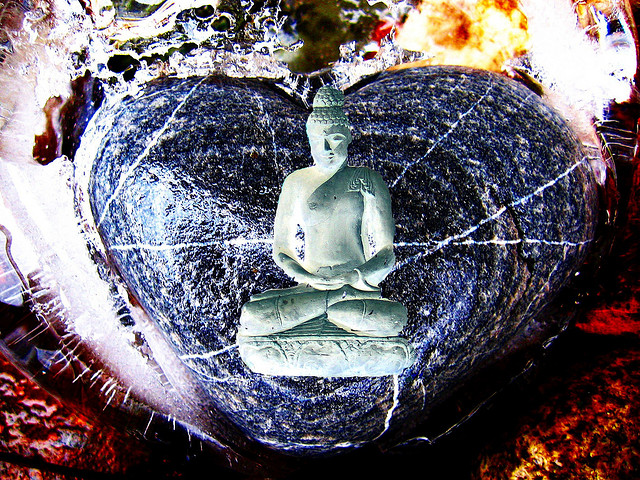Around 2,500 years ago, the Buddha left his family to go on a journey to eradicate suffering for himself—and everyone else—once and for all.
It doesn’t sound very romantic, right?
Maybe not, however, his decision that day changed the course of his life forever—and ours. What the Buddha had achieved after leaving his family can inspire us to celebrate Valentine’s Day in a more mindful and different way.
Buddhists don’t accept romantic love the way we do. For them, there’s one universal love that is given toward all human beings—and not an intimate love felt for one person.
Lama Yeshe puts it in a witty way:
“Ordinary love is narrow, closed-minded, and fickle. As long as your love is ordinary, your narrow mind will keep singling out one object: ‘you’re the only one for me; my only object of love and compassion.’
This Earth contains countless atoms, but you choose only one: ‘I love this atom.’ That’s such a silly mind; completely silly. There are countless atoms throughout all of space but tied by attachment your squeezing mind chooses only one. Then, whenever you encounter another atom, you feel insecure.”
As Lama Yeshe explains, our focus is constantly aimed at one person—one atom. If we are in a relationship, we expect so much from one person and focus solely on them. And if we are single, we might feel lonely and wish there was one atom on which we could focus our love.
It might be challenging to find a “middle way” when it comes to love, since it’s an intense emotion reinforced with mental activity. Nonetheless, reflecting on what the Buddhists believe can help us love differently.
In the eyes of a Buddhist, maitrī is authentic and pure love. It means to feel compassion, kindness, goodwill, and love toward all human beings, equally, without any exceptions—including our partners.
I’m not saying we should leave our partners like the Buddha did to focus on the rest of humanity, but the Buddha’s story is a motivation to broaden our perspective and distribute our love equally to all.
In real life, this is rather challenging, since our love tends to be conditioned and driven by our ego. Valentine’s Day may cause misery for some, because we expect too much from one single person. When we forget about other people, or atoms, we indirectly apply too much pressure on our partner—simultaneously they feel pressured too.
Anything in which we pour an excessive amount of energy can lead to harm. I like to compare the love inside us to a bottle of water. If we pour an entire large bottle into one single glass, the water will spill over. But if we distribute the water equally in many glasses, all glasses will be well-filled without water overflowing.
If we wish to celebrate love on Valentine’s Day (and every day) the Buddhist way, we should practice maitrī. Radiating love to everyone—regardless of what we receive from them—is miraculous. By all means, there are degrees to our love. What we give our partners might be more special, unique, or more intense, but we still remember others.
How can we distribute the love within us? When we see others as ourselves, it’s no longer tough to give them something. So long as there is a “me” and a “you,” we will never be able to move beyond the barriers of our minds. What is separated from us is naturally our enemy. This is why reflecting on oneness is of great benefit.
Buddhists call this bodhicitta, or awakened heart/mind—a mind that is fully dedicated to others. According to Lama Zopa Rinpoche, it might be the best medicine for all our illnesses. What does this mean? It means to let go of the thought of “I”—the false sense of self—so we can be able to cherish others. In Buddhism, bodhicitta means to seek enlightenment for the sake of others. It’s the source of liberation and happiness.
That said, we can make it our purpose to bring happiness to other human beings and alleviate their suffering in any way possible. But it isn’t possible when we are attached to only one person. If we try to practice maitri or develop the bodhicitta mind, I’m convinced it will automatically transform our romantic relationships.
When we focus on different atoms, our love for our partner won’t be rooted in neediness attachment. We inevitably bring space into our relationship. Consequently, our partner can also work on developing bodhicitta.
Filling other people’s glasses from our inexhaustible bottle will, in fact, transform all our relationships.
~
Relephant:
Buddhism: How to Make Friends with Yourself. Maitri.
Becoming a Bodhisattva: The Supreme Thought.
~
~
~
Author: Elayane Youssef
Image: Flickr/Hartwig HKD
Editor: Travis May
Copy Editor: Yoli Ramazzina








Read 4 comments and reply